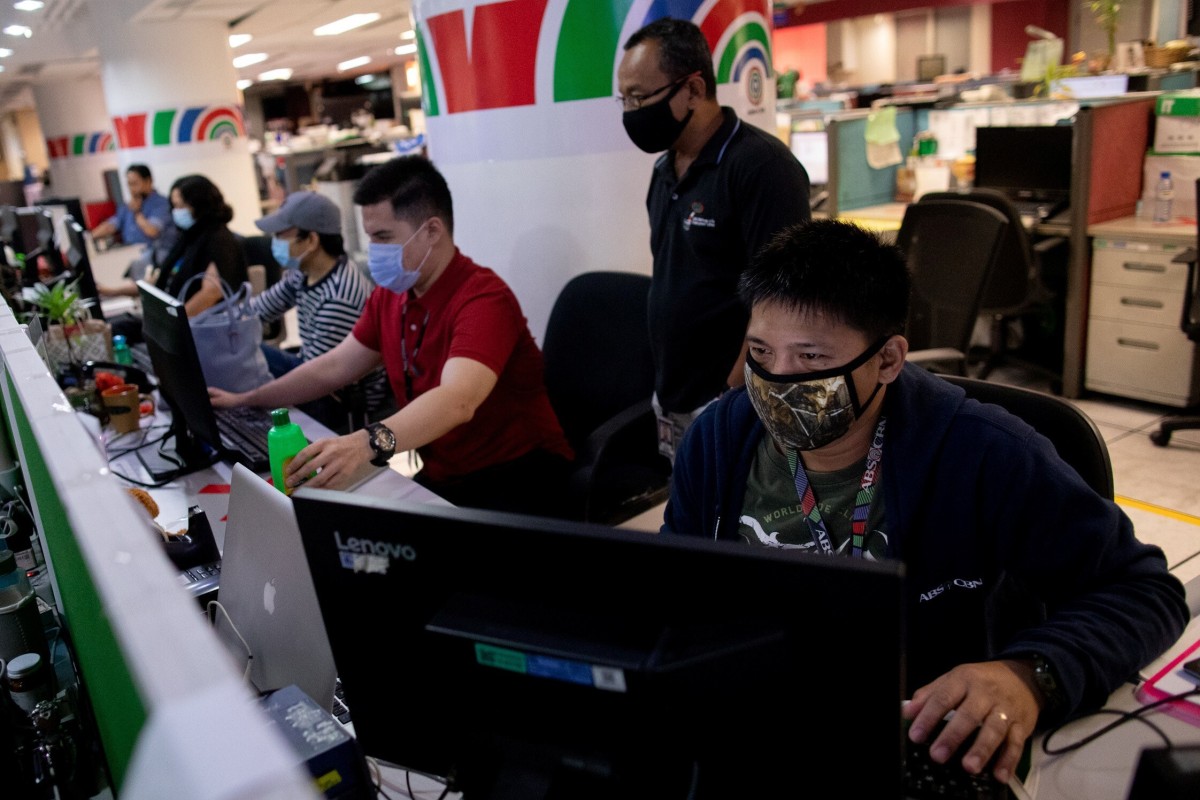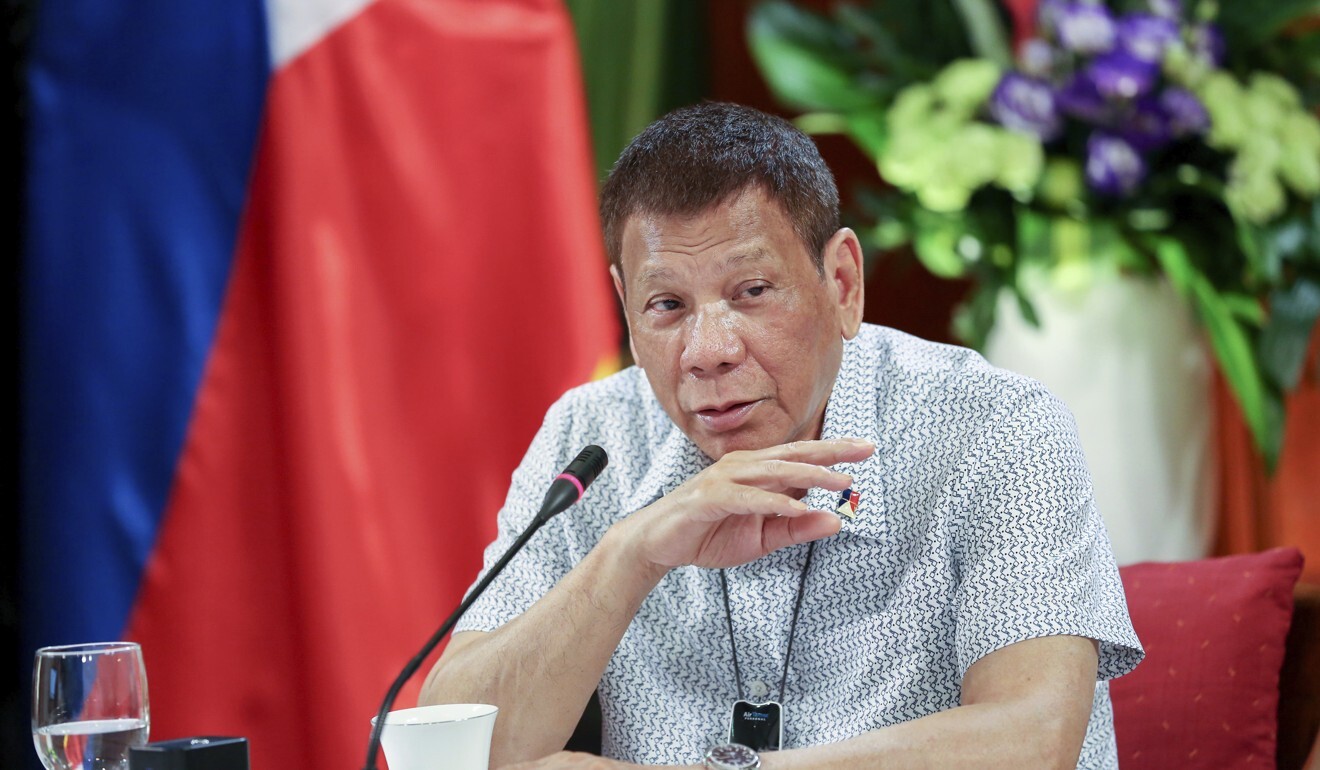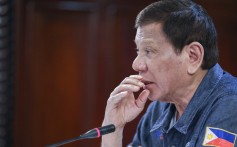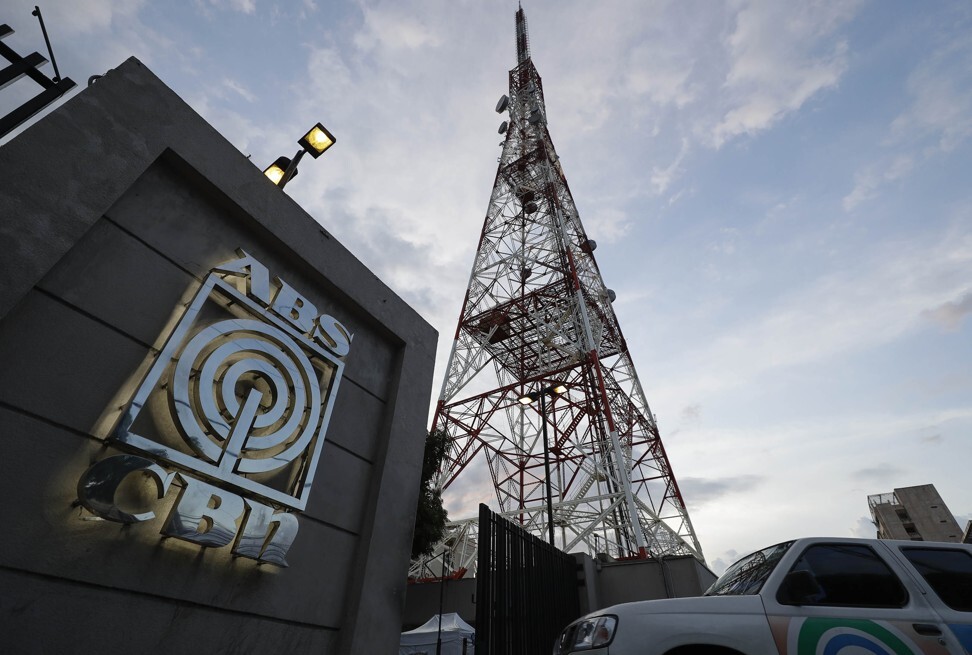Eugenio Lopez has walked away from the station and the family business empire, seemingly relenting in his battle with the country’s president
Lopez was the latest in a line of tycoons in the Philippines to run afoul of Duterte, who made bringing down ‘oligarchs’ one of his campaign promises
Raissa Robles
Published: 3 Oct, 2020

Writers and editors of ABS-CBN in the newsroom at their Manila headquarters following orders by the telecoms regulator to cease operations. Photo: Reuters
Eugenio “Gabby” Lopez III’s September 24 resignation as chairman emeritus of ABS-CBN, with the Philippines’ biggest broadcast network now on the verge of collapse, is seen as a lesson in what happens to tycoons who cross paths with President Rodrigo Duterte.
ABS-CBN’s 25-year broadcast licence lapsed in May, and two months later pro-Duterte lawmakers blocked the issuance of a new one – fulfilling a threat the president had made two years ago.
At the end of last year, the network had a 42 per cent share of viewers nationwide – outstripping the 30 per cent share of its closest rival, GMA Network – according to ratings firm Kantar Media Philippines. Kantar managing director Jay Bautista estimated that ABS-CBN’s received the lion’s share of the industry’s advertising revenue at the time, which was upwards of 500 billion pesos (US$10.3 billion).
What next for ABS-CBN, the network that fell afoul of Duterte?
15 Jul 2020

By the end of August, the network was a shell of its former self. It had started slashing its workforce of 11,000 and had also closed all of its radio and television outlets, leaving only a skeleton crew for news and migrating content to the internet, said Jing Reyes, head of ABS-CBN’s integrated news and current affairs division. More lay-offs could still follow, she added.
Duterte has had the knives out for ABS-CBN since his presidential campaign in 2016. He has said he paid for a campaign advertisement that year, but the network never ran the material and sparked the president’s ire by being slow to pay back the fee. It did, however, broadcast an advertisement by an opposition senator that stressed Duterte’s penchant for expletives, and ran stories about the president’s alleged secret bank accounts.
Philippines’ ABS-CBN closes regional stations that served remote communities for decades
In March 2017, he publicly railed against the Philippine Daily Inquirer, the country’s largest newspaper, and ABS-CBN for “rude”, “unfair” and “trash” reporting, especially concerning his war on drugs. He also warned the Prieto and Lopez families, the respective owners of the Inquirer and ABS-CBN, of payback by way of “karma”. The Prieto family sold their stake in the Inquirer in November 2017.
As for ABS-CBN, Duterte said of the company in 2018: “I will not let it pass. Your franchise will end. You know why? Because you are thieves.”
‘HE WILL TREAT YOU WORSE’
This was not Lopez’s first encounter with a difficult president. Duterte’s predecessor, Benigno Aquino III, “was not happy with ABS-CBN”, as was the case with most administrations, according to a prominent member of the Philippine business community, who spoke on condition of anonymity.
Lopez first tried to renew ABS-CBN’s franchise in 2014, during the Aquino administration. He withdrew the application after the then president signalled he would not back it, a source said, though Aquino’s former presidential spokesman Edwin Lacierda has denied this.

President Rodrigo Duterte at the Malacanang presidential palace in Manila in September. Photo: AP
While his relationship with Duterte got off to a rocky start, Lopez for years had seemed untroubled by the president’s threats. In fact, during an ABS-CBN shareholders’ meeting in April 2017, the media magnate was bullish about the possibility of obtaining a new licence.
“We haven’t gone through an administration that, at one point or another, has not had some issue with the media in general and ABS-CBN in particular,” Lopez said at the meeting. “So it is part and parcel of our work being a media institution. Suffice to say, the way we will deal with these problems will be not in the public eye but privately.”
This February, during a Senate hearing on renewing ABS-CBN’s franchise, Duterte’s former chief aide, Senator Christopher Go, gave the company another warning sign. “All the president wants is fair reporting,” he said. “If you are bad towards the president, he will treat you worse.”
If tycoons are back in Duterte’s good books, what happened to ABS-CBN?
17 May 2020

ABS-CBN sources told This Week in Asia that Lopez had made a mistake in being slow to return the money Duterte had paid for the unaired advertisements. The company had paid a first portion of the fee back to Durterte, but when it sent the second and final portion, Go – who was still working for the president at the time – told ABS-CBN to hold on to it, which the sources said gave Duterte ammunition to go after Lopez and the network.
It was a meeker Lopez who appeared before the House of Representatives in June to beg for the franchise in a session that also saw him face a barrage of questions, including on his citizenship. The Philippine constitution bars foreigners from owning media outlets, and Lopez had been travelling using an American passport.
It took his legal counsel to explain that since Lopez was born in Boston to Filipino parents, he was allowed to hold dual American-Filipino citizenship, but not before he had been asked to recite the Patriotic Oath – the Philippines’ national pledge.
Despite submitting himself to the intense and at times humiliating questioning, the House committee voted 70-11 on July 10 to reject the issuance of a new franchise for ABS-CBN.
‘DESTROY THE OLIGARCHS’
There is still much speculation as to the reasons behind Lopez’s resignation. Some analysts said it could have been a way to take the heat off, or perhaps protect, the family’s business empire, which also includes the power company First Gen, real estate developer Rockwell Land and several industrial estates.
When he resigned on September 24, also giving up his role as director in all other companies owned by his family, Lopez said he was doing so for “personal reasons”. He could not be reached for comment on the matter. But to observers, he had suffered the fate of other tycoons who had rubbed Duterte the wrong way.

Duterte targeted ABS-CBN for its news coverage critical of him. Photo: AP
The ABS shutdown “certainly sends a signal”, said the prominent Philippine business-person. “It’s a purely authoritarian play. If you had a company to take care of, shareholders and employees, [standing up to Duterte] would give you second thoughts. The business community is the easiest community to scare.”
Ron Acoba, the founder and managing director at Trading Edge Training and Consultancy, said what happened to Lopez was “more or less the same scenario” as had befallen Roberto Ongpin, whom Duterte had singled out upon assuming office as an “oligarch” whom he wanted to “destroy” by way of example.
Philippines: fake accounts shut down by Facebook promoted Duterte, China
24 Sep 2020

Ongpin, who once sat on the board of the South China Morning Post, owned online gaming company Philweb before its licence was revoked by the Duterte government in 2016, after the president railed against “oligarchs who get privileges, concessions, franchise with their saliva only as their capital”.
“Similar to Philweb, [ABS-CBN] was also pushed against the wall with the government not renewing their licence,” Acoba said.
“Roberto Ongpin was essentially ‘forced’ to resign, with the president calling him out in public. His stake was later on sold to Gregorio Araneta, who was on friendlier terms with the [Duterte] administration. The company has since then received a licence to operate. Lopez’s resignation may be a step in a similar direction.”
Ironically, Araneta is from a wealthy and politically powerful family. He owns at least 19 companies in property management, mining, oil and gas and transport, and his wife is Irene Marcos, sister of former senator Ferdinand “Bongbong” Marcos Jnr and current Senator Imee Marcos, who are both close Duterte allies.
“If you study all the biggest business houses in Southeast Asia, most, if not all of them, unfortunately, have a patronage with the government,” Acoba said.
In his opinion, because Lopez and ABS-CBN did not play ball with Duterte, the company no longer has “a viable future”, with its share price now down about 90 per cent since its peak in 2016.
For Jing Reyes, the news chief at ABS-CBN, all that is left for the company to do is continue to cover the news while hanging on to existence by a thread.
“We are all trying to survive, basically,” she said. ■

Raissa Robles has written for the SCMP since 1996. A freelance journalist specialising in politics, international relations, business and Muslim rebellion, she has contributed to Reuters, the Economist Intelligence Unit, Daily Mail, Times of London, Radio Netherlands and Asiaweek. She runs the award-winning investigative and opinion blog, raissarobles.com. Her book, Marcos Martial Law: Never Again, a brief history of the dictatorship won the 2017 National Book Awards for Non-Fiction. Her Twitter handle is @raissawriter.
No comments:
Post a Comment